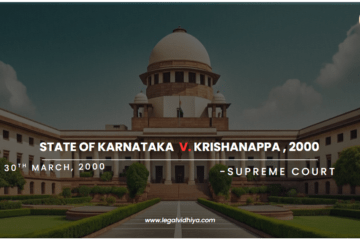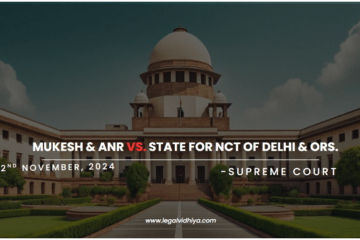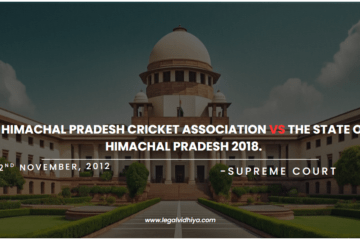
Dr. A. Lakshmanaswami Mudaliar v. Life Insurance Corporation of India, AIR 1963 SC 1185
| Citation | (1963) AIR 1185 SC |
| Date of Judgment | 13th December 1962 |
| Court | Supreme Court of India |
| Case Type | Civil Case |
| Appellant | Dr. A. Lakshmanaswami Mudaliar |
| Respondent | Life Insurance Corporation of India |
| Bench | Chief Justice B.P. Sinha and Justice J.C. Shah. |
FACTS OF THE CASE
In the case of Dr. A. Lakshmanaswami Mudaliar v. Life Insurance Corporation of India, the following key facts were presented:
- Dr. A. Lakshmanaswami Mudaliar was appointed as the Medical Director by the Life Insurance Corporation of India (LIC) on a contractual basis.
- The contract between Dr. Mudaliar and LIC explicitly stated that his appointment would last for a period of five years.
- However, LIC chose to terminate Dr. Mudaliar’s services before the agreed-upon term had expired, without adhering to the procedures outlined in the contract.
- Dr. Mudaliar, feeling that the termination was unlawful and in violation of the contractual terms, decided to challenge it through legal action.
- The central issue in this case revolved around whether LIC possessed the authority to terminate the contract prematurely and if such termination was conducted in compliance with the relevant procedures.
- Dr. Mudaliar argued that the termination was unjustified, lacking any reasonable grounds and breaching the provisions established in the contract. As a result, he approached the court seeking appropriate redress.
These facts formed the foundation for the legal analysis and the subsequent decision rendered by the Supreme Court concerning the termination of Dr. Mudaliar’s employment with the Life Insurance Corporation of India.
ISSUES
The key issue of the case was Validity of termination of the contract, arbitration of termination, Compliance with contractual procedures.
ARGUMENTS
In the case of Dr. A. Lakshmanaswami Mudaliar v. Life Insurance Corporation of India, both parties presented their arguments as follows:
Arguments by Dr. Mudaliar:
Dr. Mudaliar argued that the termination of his services by the Life Insurance Corporation of India (LIC) violated the terms and provisions of the employment contract. According to him, LIC had an obligation to honor the agreed-upon term of five years, and terminating his employment prematurely went against his rights under the contract. He further claimed that LIC did not follow the proper procedures laid out in the contract, failing to provide any notice or justification for the termination. Dr. Mudaliar believed that the termination was arbitrary, lacking reasonable grounds, and an unfair and unjust action on the part of LIC.
Arguments by Life Insurance Corporation of India (LIC):
LIC defended their decision to terminate Dr. Mudaliar’s contract by asserting that they held the authority to do so before the completion of the specified term. They argued that the contract did not explicitly restrict their power to terminate, thereby granting them the discretion to end the employment as they deemed necessary. LIC contended that the termination was within the scope of the contractual provisions and did not violate the agreement. They claimed that the employment contract allowed for termination under certain circumstances, and they had followed those circumstances while making the decision. Additionally, LIC argued that, as a statutory corporation, they possessed discretionary powers in employment matters and were not fully bound by the principles of natural justice. They emphasized that they had adhered to any applicable procedures in their case, therefore deeming the termination valid.
These arguments were presented before the court and thoroughly examined to determine the legality and validity of the termination of Dr. Mudaliar’s employment with the Life Insurance Corporation of India.
JUDGEMENT
The judgment in the case of Dr. A. Lakshmanaswami Mudaliar v. Life Insurance Corporation of India, decided by the Supreme Court of India in AIR 1963 SC 1185, established the following key points:
The Supreme Court asserted that an employment contract can include provisions that govern its termination, and if these provisions are violated, the termination would be deemed illegal. It emphasized that an employer does not have the authority to terminate employment arbitrarily or whimsically. The termination must be conducted fairly and reasonably, adhering to the principles of natural justice. Additionally, the Court noted that although statutory corporations like the Life Insurance Corporation of India (LIC) may not be fully bound by all the procedural safeguards of natural justice, they must still adhere to principles of fairness and reasonableness. While certain procedural aspects may not be applicable, a reasonable opportunity for the employee to express their perspective should be granted prior to termination. In the specific case under consideration, the Court concluded that LIC violated the terms of the employment contract by terminating Dr. Mudaliar’s services prematurely and without following the prescribed procedure. The Court determined that such termination was arbitrary and contrary to the principles of natural justice. Accordingly, the Court declared the termination to be illegal, and Dr. Mudaliar was granted the right to seek appropriate relief. The specific relief or remedies awarded to Dr. Mudaliar were not mentioned in the case citation, as they would depend on the circumstances and the relief sought by Dr. Mudaliar during the proceedings before the Court.
REFERENCES
This Article is written by Raktim Singha Roy of Techno India University, Intern at Legal Vidhiya.





0 Comments